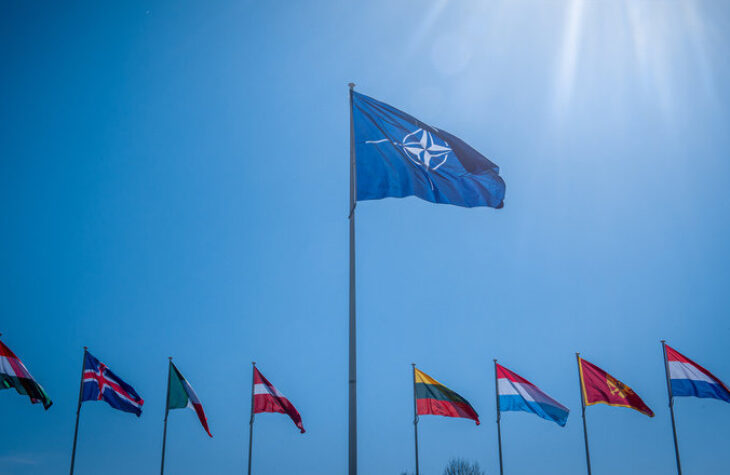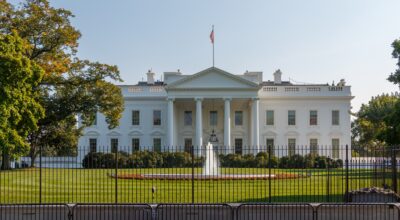
A Collectivist Reinterpretation of NATO Destroys Congressional War Powers

Introduction
In the post-WWII era of Cold War competition and an American-led global order, the U.S. established and remains currently active in seven major collective defense agreements around the world.1 Perhaps most well-known and the base model for structuring collective defense as a concept is the North Atlantic Treaty and its establishment of the North Atlantic Treaty Organization. Article V of the North Atlantic Treaty says “an armed attack against one or more of them in Europe or North America shall be considered an attack against them all.”2
Politicians, scholars, and advisors alike within the established ranks of U.S. foreign policy have adopted an understanding that Article V is a self-enforcing and “ironclad” guarantee of U.S. military support in the event of an attack. However, this interpretation is outside the understanding of Article V’s meaning at the time of ratification of the North Atlantic Treaty, and it contradicts constitutional powers explicitly given only to Congress.
Article I, Section 8, Clause 11 of the Constitution gives Congress, and Congress alone, the power to “declare war.”3 Despite clever attempts by White House and Defense Department lawyers to interpret a larger role for the president under the commander-in-chief power and a significantly limited role for Congress as essentially a rubber stamp, the one area of the war powers debate that is difficult to blur is the idea that international law, including a ratified treaty, is self-enforcing absent the weight of domestic law. Nevertheless and especially considering events in Ukraine, this view is gaining momentum and acceptance without robust supporting evidence, a dangerous state of play that threatens both the powers of Congress and U.S. sovereignty.
This brief will analyze what an interpretation of the plain text of Article V requires of the United States and outline the long-standing precedent on Article V at the time of ratification. It will also discuss Article V in the context of the war in Ukraine to demonstrate the risks posed by re-interpretation. Finally, it will make a set of recommendations for Congress to consider in order to reassert its constitutional authority.
Understanding Article V
“The Parties agree that an armed attack against one or more of them in Europe or North America shall be considered an attack against them all and consequently they agree that, if such an armed attack occurs, each of them, in exercise of the right of individual or collective self-defense recognized by Article 51 of the Charter of the United Nations, will assist the Party or Parties so attacked by taking forthwith, individually and in concert with the other Parties, such action as it deems necessary, including the use of armed force, to restore and maintain the security of the North Atlantic area.” – Article V of the North Atlantic Treaty
A plain reading of Article V establishes three things. First, there is an agreement by all parties of equity in sovereignty, and therefore equity in treatment of a breach. Second, there is a commitment to some form of action in the event of an attack, which can include but is not mandated to include military action. While the U.S. did bind itself to this obligation by ratifying the North Atlantic Treaty, neither the president nor Congress is bound to a specific form of response, ensuring both branches could temper U.S. engagement based on national interests and the appetite of the American people for war. Finally, each nation maintains the right to determine what action “it deems necessary” in a response. Article 11 also interacts with the provisions of Article V in stating that the provisions of the treaty are to be carried out “in accordance with their [each nation’s] respective constitutional processes.4
Article V is intentionally non-prescriptive in how the commitment of collective response is fulfilled. This is because at a fundamental level there is no treaty, organization, or higher level of law that supersedes the sovereignty of an individual nation, and by extension the decision to engage in warfare. As Michael Glennon argues,
“No mutual security treaty to which the United States is a party requires the United States automatically to go to war if another party is attacked or authorizes the President to use force without congressional approval. A treaty that purported to do so probably would be unconstitutional; moreover, the War Powers Resolution precludes inferring such authority from any treaty absent the enactment of implementing legislation.”5
A prescriptive and binding obligation to enter a future conflict would not only be unenforceable but miscalculates the level of risk nations are willing to assume for conflicts of the future. The phrase “such action as it deems necessary” offers a loophole of sorts, broadening the scope of contributions to a collective response. An example of this in practice comes from the German response to the September 11th attacks on the United States. The German government was intentional about crafting its collective response obligation carefully through its constitutional process, as Chancellor Schröder noted in a November 2001 policy statement.6 Further, as Michael Glennon outlined in a recent article for Lawfare, the collective NATO response to 9/11 was not an immediate and self-enforcing mechanism.7 It took into October for NATO as an organization to determine that the events of September 11th were indeed covered by Article V, requiring thorough investigation and information sharing in a time of crisis.8 Such examples demonstrate the challenges of Article V as a presumed, automatic, and forceful deterrent.
A plain reading of Article V is critical because the consensus view currently forming drastically overestimates the obligations placed on the United States. Not only does this pose a risk for the U.S. to overextend itself in commitments, which has already been the case financially and militarily in the European theater, but it also risks rewriting core U.S. constitutional obligations and established congressional precedent.
Article V Interpretation: Origins and Diversion
The historical context in which the North Atlantic Treaty was debated and ratified in the U.S. highlights a political environment dominated by congressional power and skepticism of focusing on global interests ahead of U.S. national interests. Article V sparked deep concern.
The Senate Foreign Relations Committee was dominated by noninterventionists adjusting to the catapulting of the U.S. into the global arena as a superpower at the dawning of a nuclear age. Rightly, concerns were raised about how the U.S. would be drawn into conflict under a treaty covering nearly the entire European theater. At the time, Secretary of State Dean Acheson reaffirmed repeatedly that the North Atlantic Treaty “does not mean that the United States would be automatically at war if one of the nations covered by the pact is subjected to armed attack. Under our Constitution, the Congress alone has the power to declare war.”9 Acheson also emphasized that the U.S. joining NATO would not threaten or conflict with the U.S. right to “self-determination.”
Unfortunately, despite assurances surrounding the ratification of the North Atlantic Treaty, globalist doctrine post-WWII continued to assert two contentions that now result in a warped interpretation of Article V. First, international law is employed as a higher order or obligation than U.S. domestic law. For example, President Truman grounded justification for his decision to engage unilaterally in Korea without Congress under the UN Charter. In a message to Congress Truman said, “Throughout Monday, June 26th, the invaders continued their attack with no heed to the resolution of the Security Council of the United Nations. Accordingly, in order to support the resolution, and on the unanimous advice of our civil and military authorities, I ordered United States air and sea forces to give the Korean Government troops cover and support.”10 But this has the order wrong. International law, without the force of domestic law ratified and passed by Congress, is for all intents and purposes just paper.
Further, the decisions made by the collectivist bureaucracies of international organizations also should not be presumed to legally bind the U.S. to take particular action. A recent example comes from NATO’s response to attacks on the Nord Stream pipeline systems. The North Atlantic Council went so far as to say, “Any deliberate attack against Allies’ critical infrastructure would be met with a united and determined response.”11 At present, the Council has presented no evidence that the attacks can be attributed to Russia.12 The statement not only appears to neuter the rights of each member nations right to self-determine what is appropriate after a thorough consideration of evidence, but also gives little regard for how such a claim is provocative and could easily lead to baiting the Russians to extend the conflict beyond Ukrainian borders.
Second, presidents post-WWII assert a higher degree of executive authority not actually sanctioned by the Constitution in the name of “defending the global world order” and “American primacy.” What results is not only a concentration of power within the executive branch, but overcommitment and extension of the U.S. beyond its core interests. U.S. and NATO engagement with Ukraine prior to the most recent Russian invasion is a prime example of where an unrestrained executive leads to poor policies. Ukraine is not a member of NATO, nor has it been invited to begin the accession process, yet Ukraine has been allowed to participate in NATO activities and benefit from special dialogues and councils created specifically for it dating back to 1991.13 Yet U.S. presidents of both parties, despite leading the highest contributing nation within NATO, have allowed Ukraine to become a defacto NATO member, with total disregard for how these actions could weaken the deterrence power of the alliance by taking on riskier members and daring an adversary to call the bluff.14
Clarity is Needed from Congress
The outlined elements of globalist doctrine have formed a complete re-interpretation of how an invocation of Article V would look today. For example David Frompkin theorized, “If it is now agreed by treaty that an attack on a… NATO ally is deemed an attack on the United states, then it can be argued that the President is empowered without Congressional authorization to send us to war.”15 Under a re-imagined framework that dismisses the plain reading of the text, Congressional deliberation, and assurances given at the time of ratification, a Russian attack on a NATO member country in the current climate would trigger automatic obligation for U.S. military support and provide the authority necessary for the president to meet this obligation unilaterally without a vote of Congress. What is even more concerning than the textual flaws under this framework are arguments from Congress that the original vote to ratify the North Atlantic Treaty was Congress speaking to the authorization of Article V indefinitely. Such a view not only amounts to both an abrogation of enumerated duties of Congress under Article I, but also breaks a cardinal congressional rule that the actions taken in one session of Congress cannot bind future congresses.16
Disturbingly, a majority of the Senate affirmed the radical reinterpretation by voting down an amendment from Senator Rand Paul offered to the measure adding Sweden and Finland to NATO. 87 members voted against the amendment which would have added a clarifying element into U.S. law on NATO saying, “Article 5 of the North Atlantic Treaty does not supersede the constitutional requirement that Congress declare war before the United States engages in war.”17 In opposing the amendment Senator Mitt Romney (R-Utah) said,
“We must not in any way appear to be going wobbly on Article V…Now, it’s well and good for Congress to consider war powers and a role in military conflicts, but doing so as part of the ascension of Sweden and Finland to NATO while Ukraine is under attack and while Russia may be potentially eyeing violence against NATO nations is not the time.”18
Senator Romney’s statement is indicative of both Congress’ relegation of its own duties, as well as how the status quo in U.S. foreign policy decision making is dictated by global rather than national interests.
To ensure the U.S. interprets Article V consistent with the text, congressional intent at the time of ratification, and the powers and processes of the Constitution, Congress should consider the following actions:
- Put forward a resolution clarifying congressional intent at the time of ratification of the North Atlantic Treaty.
- Amend federal law with explicit requirement that any invocation of Article V is not self-enforcing and requires congressional authorization for engagement of U.S. forces.
- Prioritize during confirmation hearings a determination that relevant Cabinet level, Department of Defense, and State Department officials have the proper interpretation of Article V and the role of Congress.
The re-imagined framework on Article V cannot be allowed to stand, not only because its flaws damage the sanctity and precedents of the constitutional process but because it opens the door to leaving U.S. decisions of war and peace to a single president and the whims and wishes of amorphous international law. After decades of botched wars initiated by gallivanting administrations, now more than ever a strong Congress that refuses to relinquish the war making power is needed and will set the standard for the next era of U.S. foreign policy.
Endnotes
1. “Mapped: America’s Collective Defense Agreements”, Defense One, February 3, 2017, https://www.defenseone.com/ideas/2017/02/mapped-americas-collective-defense-agreements/135114/
2. The North Atlantic Treaty, Article V, April 4, 1949, https://www.nato.int/cps/en/natolive/official_texts_17120.htm
3. U.S. Constitution, Article 1, Section 8, Clause 11: https://www.law.cornell.edu/constitution-conan/article-1/section-8
4. Ibid, The North Atlantic Treaty.
5. “U.S. Mutual Security Treaties: The Commitment Myth”, Michael J. Glennon, Tufts University – The Fletcher School of Law and Diplomacy, Columbia Journal of Transnational Law Vol.24 March 14, 1986. https://papers.ssrn.com/sol3/papers.cfm?abstract_id=4057331
6. “Alliance Solidarity Is Not a One-Way Street”, https://usa.usembassy.de/gemeinsam/regerklschroe110801e.htm
7. “The NATO Treaty Does Not Give Congress a Bye on World War III,” Michael Glennon, Lawfare, March 23, 2022. https://www.lawfareblog.com/nato-treaty-does-not-give-congress-bye-world-war-iii?utm_source=pocket_mylist
8. “Invocation of Article V Confirmed”, NATO, October 2, 2001. https://www.nato.int/docu/update/2001/1001/e1002a.htm
9. “The Meaning of the North Atlantic Pact: Address”, Dean Acheson, Delivered March 18, 1949.
10. “Special Message to the Congress Reporting on the Situation in Korea”, Truman Library, July 19, 1950. https://www.trumanlibrary.gov/library/public-papers/193/special-message-congress-reporting-situation-korea
11. “Statement by the North Atlantic Council on the damage to gas pipelines”, NATO, September 29, 2022. https://www.nato.int/cps/en/natohq/official_texts_207733.htm?selectedLocale=en
12. “NATO Formally Blames Sabotage for Nord Stream Pipeline Damage”, Wall Street Journal, September 30, 2022. https://www.wsj.com/articles/nato-formally-blames-sabotage-for-nord-stream-pipeline-damage-11664449396?mod=itp_wsj&ru=yahoo
13. “NATO-Ukraine relations Fact Sheet” NATO, February 2022. https://www.nato.int/nato_static_fl2014/assets/pdf/2022/2/pdf/220214-factsheet_NATO-Ukraine_Relations_.pdf
14. “Does Nonmember Ukraine Have a de Facto Article 5 Commitment from NATO?” Ted Galen Carpenter, CATO Institute, May 10, 2022. https://www.cato.org/commentary/does-nonmember-ukraine-have-de-facto-article-5-commitment-nato?utm_source=pocket_mylist
15. David Frompkin, “Entangling Alliances”, Foreign Affairs, Vol. 48, No.4., July 1970. https://www.jstor.org/stable/20039476
16. Dates back to William Blackstone and has been interpreted as a common law principle in U.S. court cases.
17. Congressional Record, “Text of Senate Amendment 5191”, Vol. 168, No.129, August 2, 2022. https://www.congress.gov/congressional-record/volume-168/issue-129/senate-section/article/S3868-4 ; Recorded vote: https://www.senate.gov/legislative/LIS/roll_call_votes/vote1172/vote_117_2_00281.htm
18. CSPAN, U.S. Senate Session August 3, 2022, Mitt Romney, R-UT, 04:23:11. https://www.c-span.org/video/?522156-1/senate-votes-ratify-sweden-finland-joining-nato-95-1



